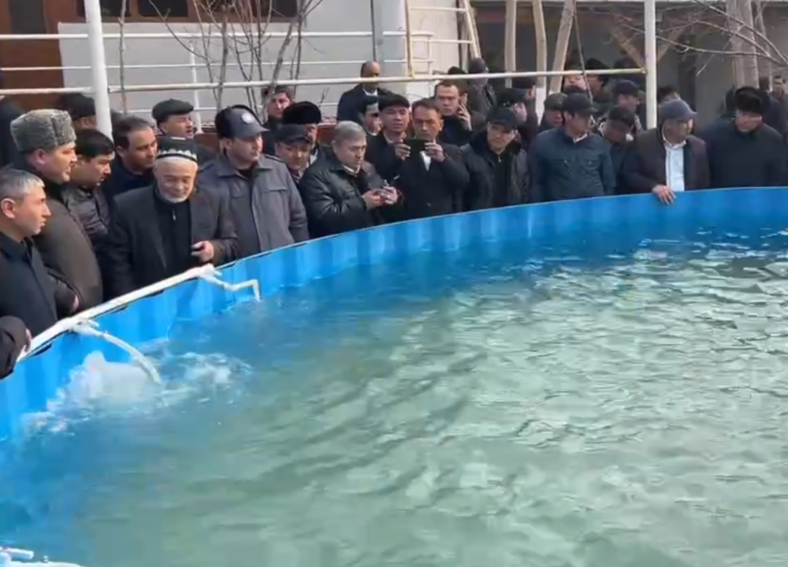Disappearing fish farms and powerplays in Central Asia
Controversy sparked In Uzbekistan over the small fish farms that disappeared immediately after their inauguration was broadcast live on TV in a village in the Namangan region. A story that recalls the tradition of ‘deceptive demonstrations’ that has regularly resurfaced in the region since the time of the tsars' visits.
Tashkent (AsiaNews) - In a village in the Namangan region of Uzbekistan, artificial reservoirs have been set up for the breeding of aquatic organisms, and in the arlyk, the small canals, farm ducks have been placed, with the event being broadcast on the first channel of state television. The aim was to demonstrate the effectiveness of government programmes for the development of the domestic economy and private gardens, according to a typical Soviet-era scheme of ‘deceptive demonstrations’ that are dismantled immediately after the event.
The video reported on seminars held to provide instruction on fish farming available to private individuals, commissioned by President Šavkat Mirziyoyev himself to encourage activities capable of increasing revenues for all, given that Uzbekistan is still too dependent on the overseas remittances of migrant workers. In the demonstration village, two poor families were chosen, and the fake ponds were set up in their courtyards and filled with trout and other fish, claiming that this activity can guarantee an annual income of between 50 and 60 million som (4-5 thousand dollars). But the next day the courtyard was as desolate as ever, and not even the eggs laid by the ducks had been left behind.
This type of illusionary campaign is also widespread in other Central Asian countries, such as Turkmenistan, where on 22nd March thousands of state employees and students were forced to participate in the great ‘greening’ operation led by the president himself, Serdar Berdymukhamedov, spending 12 hours under the sun without food or water, pretending to plant and look after trees all over Ashgabat. This initiative is repeated at least a couple of times a year, is widely advertised on television programmes, and the saplings regularly die a few days after being planted due to a total lack of care.
Last summer a new factory was opened in Kazakhstan to produce electronic equipment capable of recording traffic violations. Shortly afterwards, street performers were hired in Almaty, young men and women who were filmed assembling video cameras and microphones, also filmed by the television cameras under the pleased gaze of the managers, who later admitted that ‘they needed people with an attractive appearance’, for a factory that has not yet produced a single machine.
As is tradition, dating back not only to Soviet triumphalism, but even to the travels of the tsars and tsarinas, visits from important dignitaries are always prepared for by restoring the façades of the buildings on the main streets and resurfacing the roads, even in the rain or snow, and even the plants are painted to make them look healthy. In 2016, before the summit of the former Soviet countries of the CIS, the trees of Bishkek were repainted on the visible part, leaving traces of dripping green on the pavements, while the back of the plants remained in their usual greyness.
When Šavkat Mirziyoyev became president for the first time in 2015, in the Fergana region the already harvested cotton was glued back to the ground to demonstrate the wealth of the crops, while in 2022, on the eve of Kasym-Žomart Tokaev's arrival at the University of Almaty, a large fountain appeared in the courtyard and a pond next to the car parks, which disappeared immediately after the presidential visit. Also in Tajikistan in 2020, the televisions showed President Emomali Rakhmon at the opening with great fanfare of a large shopping centre in the Rudaki district of Dušanbe, and a new textile factory for 100 jobs, with all the workers in brand new uniforms, who returned home without so much as a scarf immediately afterwards. Not to mention the hundreds of solemn ceremonies during the time of the ‘eternal president’ of Kazakhstan, Nursultan Nazarbaev, the great master of optical illusion for all of Central Asia.
This time the disappearance of the fish and ducks in Uzbekistan was reported on some Telegram channels, infuriating the khokim, the country's mayor, who immediately fired the official responsible for the farce, and ordered that at least some fish be returned to the local pond. But this will not be enough to stop the ‘theatre of power’.
12/02/2016 15:14
07/02/2019 17:28







.png)










